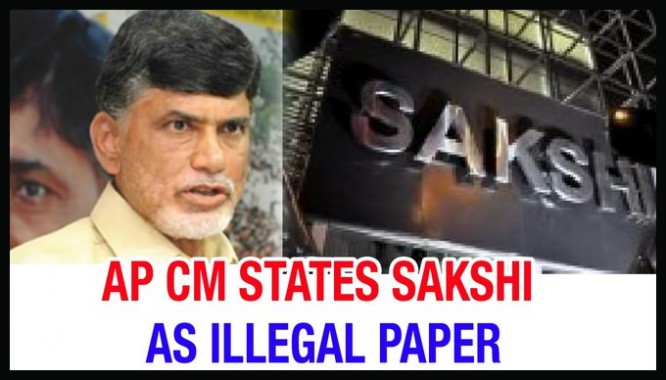AP’s political media yells ‘free speech’
Since the 2014 elections, there’s been a battle inside and outside the Andhra Pradesh state assembly between the ruling Telugu Desam Party (TDP) and the opposition YSR Congress Party with suspensions and attempts to file defamation cases. Media houses like Eenadu and Andhra Jyothi, which are pro-TDP, are ranged against the Sakshi newspaper and TV channel which is owned by YSR Congress Party leader Jaganmohan Reddy.
At the time of its launch, the Sakshi group’s raison d’etre was to confront the anti-Congress stand of Eenadu and Andhra Jyothi. In fact, Reddy had openly declared the need to have his own media house to take on the opposition. In the first few weeks and months after Sakshi’s launch, a bitter skirmish broke out between Eenadu and Sakshi. The papers publicly washed the dirty linen of each other’s dubious business practices on the front pages.
Since then, the later political entrants into the Telugu media market such as Nava Telangana and Namaste Telangana have also declared their political affiliations.
It was Eenadu which pioneered open political affiliation when, in the early 1980s, it professed its support for the TDP and its then leader N.T. Rama Rao, known as NTR. Eenadu is believed to have powered the TDP campaign as a non-Congress alternative and within a short time it helped NTR become chief minister of Andhra Pradesh.
This modus operandi has remained the template and aspiration, more or less, for most political entities in the Telugu states: to have a media megaphone under one’s control and to drive politics and business rigorously with its help. As for the media houses, they are enthusiastic participants in the political slugfest between the two main parties.
The Eenadu owners ran into serious trouble during former CM YS Rajasekhar Reddy’s regime when the Reserve Bank of India cracked down on Margadarsi Financiers, owned by the media baron, Ramoji Rao (). While Sakshi paper and TV managed by Jaganmohan Reddy, his son, provided the media ammunition, YS Rajasekhar Reddy’s government also raided the properties of the Eenadu group and attempted to attach its assets.
At that time, Eenadu mobilised the support of national media bodies like the Editors’ Guild of India, claiming that it was a threat to the freedom of the press and that the government was taking vindictive action against it because of its ‘fearless journalism’.
Jaganmohan Reddy split from Congress party after the death of his father and formed YSRCP (Yuvajana, Sramika, Rythu Congress Party). But soon, the assets of Sakshi media house and Jaganmohan Reddy came under the scanners of the enforcement directorate and the CBI. Reddy has already served time in jail and is out on bail.
He contested the elections in 2014 and gave a tough fight to the TDP. Both Reddy’s YSR Congress Party and his media house have been energetically raising the political temperature in Andhra Pradesh as the main opposition. Just before the 2014 elections, an uneasy truce dawned in the conflict between Eenadu and Sakshi.
The latest bout of the fight appears to be the work of the Andhra Jyothi group. The ABN Andhra Jyothi channel has been running stories about the imminent confiscation of the properties of the Sakshi group under a new anti-corruption law.
It was a bit of a farce when the Andhra Pradesh government recently passed the Andhra Pradesh Special Courts Act to deal with corruption. The Act, which received the President’s assent in May, empowers the state to constitute special courts “to facilitate time bound disposal of corruption cases and attachment of assets.”
It was passed amid vehement protests and walk-outs by the YSR Congress Party which felt that it was the target of the Act. TDP Finance Minister, Yanamala Ramakrishnudu, gave credence to this belief when he said that the Sakshi paper and Sakshi TV properties will be confiscated.
K. Ramachandra Murthy, Editorial Director of Sakshi, said that such a move is unlikely as separate Enforcement Directorate proceedings are already underway.
The Telugu news media market is one of the largest in the country with some 22 news channels and eight major newspapers with a good market presence. While very few of the TV news channels have broken even, those with big business interests to protect continue to run their media enterprises as an instrument for shaping the political climate favourably.
When in opposition, the media houses champion free speech along with their cohort political parties. When the party they support is in power, they welcome a crackdown on the media. Both the TDP and the TRS (Telangana Rashtra Samithi in Telangana) have mastered the technique of wooing journalists and journalists’ unions with promises of real estate, healthcare, and other sops from the public exchequer, absolving the owners of the responsibility for fair employment practices.
Given this scenario, where does the free speech debate stand? If a business entity violates the laws, but happens to run a politically vociferous media house, can the media house be held accountable for its violations of the law or will it be seen as muzzling the freedom of the press?
If a business entity is not accountable for its violations of the law by virtue of the fact that it also runs a media house, does that mean media houses are above the law? And, if one group is punished, what about the rest of them? Will they get their turn when the opposition is in power?
The nature of the rivalry among Telugu media houses also reflects the kind of morally bankrupt politics we have been witness to since 2014. In Andhra Pradesh, the TDP is attempting to decimate YSR Congress Party by buying up its elected MLAs, much like the Telangana Rashtra Samithi in Telangana, which is buying up elected legislators from all political parties, including the lone member of the CPI (much to the latter’s embarrassment!).
In this political climate, no murmur of dissent from any quarter is allowed. Loyalty can be had, but for a fee. This atmosphere has infected the media houses as well and the casualty is civilised engagement with ideas in a free and fair debate, whether in media spaces or in the legislature.
The project of mutual annihilation and the desire for complete domination of all public discourse reminds one of a quote from The Godfather: “Like many businessmen of genius, he learned that free competition was wasteful, monopoly efficient. And so he simply set about achieving that efficient monopoly.”








